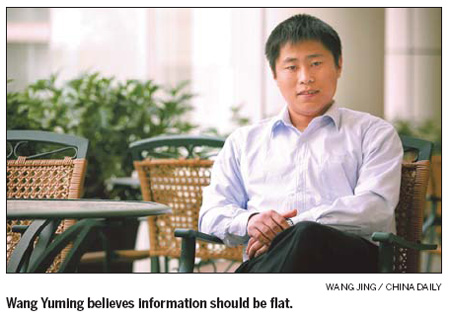

Wang Yuming counts the many influences that have changed his life.
He won a copy of Thomas L. Friedman's best-selling book The World is Flat: A Brief History of the Twenty-First Century in a Tsinghua University lecture a few years ago.
The book had yet to be published in Chinese, but the 593-page tome in English resonated with him. Friedman's belief that education should be made "flat", or available to all people, left an indelible impression.
Wang, 31, an Internet entrepreneur, met his wife, Lu Hua, eight years ago at a commodities trading seminar in Shandong province. He recalled that she naturally attracted him by wearing a yellow dress, even though she barely muttered a word at the table.
And there was another cherished moment: The day he heard the phrase "venture capital" during a campus lecture.
He realized for the first time that chuangye, or starting one's own business, was not beyond his reach.
"From then on, my life changed greatly," Wang told METRO early Sunday.
He had just returned from a promotional event for a startup company that lasted more than eight hours, but exhaustion hardly tamped his vigor and passion.
Wang said he believes activities can change people's lives.
"Meanwhile, people can find friends with the same interest through an activity, even their soulmates," he said.
In 2008, when he was still an MBA student at Tsinghua University and head of a campus Internet association, Wang started jeehe.com, a website that lists activities online and informs people about where and when to go.
"Jeehe.com is like an online poster platform," Wang said. "The activities include campus lectures, performances, sports events and discount offers from different shopping malls."
Citing the ideas of Friedman, the Pulitzer Prize-winning New York Times columnist, Wang agrees that information should be "flat" - and that each person should have the right of equal access to useful information.
Jeehe.com, which is run by 20 employees, now boasts an average of 25,000 hits from unique visitors per day. The company targets students and white-collar workers, Wang said.
"The invisible wall between universities and society has been cracked because of Jeehe, as white-collar workers can find out about campus lectures and students can participate in "brilliant social activities" off campus.
Wang said he was destined to become an entrepreneur because he was born to a family that disdained the conventional route to making a living.
"My parents never planted apple trees, though it was a major business for people living in my hometown," Wang said of the family home in Qixia, Shandong province, a town famous for sweet and crisp apples.
Instead, his parents chose unusual ways to make money.
"They sold fish, baked sweet potato, transported junk and now they feed 180 ducks at home," Wang said.
The entire family pitched in and hard work paid off. Wang's parents purchased the county's first tractor and first TV set, and in 2004 built the only two-story house in their county.
"We like taking risks," he said. "I have the gene that drives me to take challenges and makes me never satisfied with the status quo."
In his childhood, Wang helped his parents carry junk and hawk fish. Afraid of being recognized by friends, Wang wore sunglasses when he was a fifth-grade pupil. But the most rewarding part-time job, he said, was selling fish in his mountainous hometown. In the summer, Wang rode a bike to every village in his county.
"One day, a heavy rain washed away the path. I carried my bicycle and fish box on my shoulder," Wang said. "I was still selling my fish at 8 pm, when families already finished their dinner. Some people laughed at me and said, how did you sell fish when everyone had meals? But I did sell out the fish after 8 pm."
Wang said he netted as much as 300 yuan per day when business was good, a sum that he would never imagine.
"I developed a sharp eye for finding business opportunities," Wang said. "When I was a college student in 1996, I even sold instant noodles on campus when I found students often got hungry at night. To everyone's surprise, it made a good profit."
Though Jeehe.com is yet to make a profit, Wang is constantly improving the site and looking for new ways to make money.
"Several investors contacted with me and I hope we can make a deal in the near future," he said.
This month, Wang launched a new website, 55tuan.com, to sell cheaper goods in bulk to groups.
"Again, I am always trying to find fresh things or opportunities," Wang said, smiling.
"People should never regret what they have done, but what they haven't done."